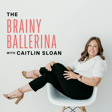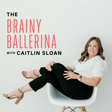
18. A Dream and a Day Job with Kara Tatelbaum
Kara Tatelbaum is a dancer, choreographer, teacher, coach and writer based in New York City. She earned her BFA in Dance from Tisch School of the Arts at NYU and MFA in Choreography from The Conservatory of Dance at SUNY Purchase. Kara is the founder of professional company independentdancemaker and author of Putting My Heels Down - a memoir of having a dream and a day job.
Kara’s memoir is to this day one of the most honest and hilarious books I have ever read and I am thrilled to share her story on the pod. Kara shares how she opened up performing opportunities for herself through her choreography and how she balances her dream and her day job. One of my biggest takeaways from this conversation was the power of having choices and the importance of not pigeonholing yourself as a dancer. Kara is one of those people who always finds a way to make her dream a reality - get ready for a huge dose of inspiration!
Key Moments:
- Early dance training [2:23]
- The decision to attend college for dance [6:06]
- Exploring her choreographic voice [9:10]
- Starting her own professional company at 22 years old [10:58]
- Balancing your dream and your day job [13:42]
- How asking for help will further your dance career [18:02]
- How Kara got started writing a memoir and her experience through the process [22:10]
- What Kara’s life looks like now as an author, instructor, choreographer, performer and coach [28:59]
- Why Kara’s story resonates so much with dancers [36:04]
- Her biggest piece of advice for dancers pursuing a career [40:19]
Connect with Kara:
HER WEBSITE: karatatelbaum.com
INSTAGRAM: instagram.com/karatatelbaum
Links and Resources:
Join the Brainy Ballerina Book Club
Get your copy of Putting My Heels Down: A Memoir of Having a Dream and a Day Job (affiliate link)
Get your copy of The Ultimate Audition Guide
Let’s connect!
My WEBSITE: thebrainyballerina.com
INSTAGRAM: instagram.com/thebrainyballerina
1-1 Career Mentoring: book your complimentary career call
Questions/comments? Email me at caitlin@thebrainyballerina.com

